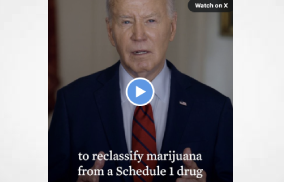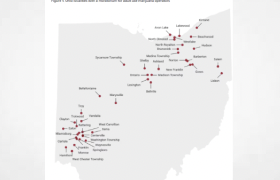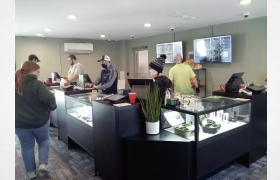ORCA’s major focus (as we have noted) is on passing bills for:
- Automatic expungement of cannabis convictions
- Legal cannabis export
- Fixing social consumption
- Ending employment discrimination for off-hours cannabis use
- Tackling unnecessary and expensive regulatory burdens relating to manifests, transportation, delivery, storage, and B2B sampling.
1) Automatic Expunctions For Past Cannabis Offenses
Description: Automatically removes past cannabis convictions and offenses from records without requiring manual expunction procedure.
Our proposal would change the current system of expungement through an application system to a system that automatically reviews and expunges the appropriate past cannabis convictions from peoples’ records without a need for an application. This is similar to the new expungement law in California and elsewhere, and what folks are fighting for in Canada. This is important because the application process is expensive, time-consuming, and circuitous. As a result, many have not taken advantage of the opportunity. This bill would help many more people.
The concept for this bill has been wildly popular this session, and we’ve really seen a sea change in the way lawmakers view past cannabis arrests – most reiterate our position that prohibition was wrong. As such, we’re optimistic about this bill’s chances of passing this year.
2) Exporting Surplus Cannabis Out-Of-State
Description: Permits the Governor to enter into inter-governmental agreements with other governments to export cannabis out-of-state
Our meetings with legislators have been very successful, and most understand that the current system of illicit market production we have is unsustainable. There is general agreement that we need to create a legal pathway for that cannabis to leave the state – and in so doing, we can create tens of thousands of living-wage jobs and add innumerable dollars to our state’s coffers for education and other services.
3) Social Consumption/ Cannabis Lounges / Tasting Rooms
Description: Creates exemption in the Clean Indoor Air Act to allow for limited licensing of indoor consumption spaces specifically for cannabis.
There have been significant strides on this issue since 2017 when it was first discussed in the legislature, though it’s unclear if we have the necessary political capital to make this massive change this year. Several opponents consider any legislation that alters the Clean Indoor Air Act in any way as a total non-starter. Others – like us – say we MUST create those exemptions in order to move forward on this issue.
We are working with a strong group of advocates under the umbrella of the New Revenue Coalition to work on the next steps of turning this concept into law. If you are interested in providing testimony in support of this bill, please consider joining us at a hearing on February 28 in Salem, and attend our Monthly Member Meeting on February 25.
4) Employment Protections for Off-Hours Cannabis Use
Description: Prohibits employers from not hiring or firing a candidate/employee for off-hours cannabis consumption.
A version of this bill was introduced to the Senate Judiciary Committee in 2017 as SB 301. We are spearheading the conversations this year with lawmakers and have gotten this concept reintroduced for 2019.
If Vancouver BC cops can consume cannabis safely during their off hours without fear of losing their job and their livelihood, then we think the average worker in Oregon should be allowed to as well.
5) Prohibits medical cannabis consumers from being denied organ transplants based on having cannabis in their system
Description: Prohibits folks consuming medical cannabis with the recommendation of a doctor from being denied entry or participation in programs where they would be the recipient of a donated organ.
This one is literally life and death for some people, and it was a matter of life and death for several long-time advocates and activist buddies who are no longer with us – people like Jim Klahr and Jim Greig. No one should be denied life-saving treatment because they chose to consume cannabis. There has been significant pushback from a few medical providers, and we are looking for testimony in support. If you have a story to share please contact Miranda.
6) LIGHTNING ROUND, Technical Fixes
OLCC may cap licenses based on market demand.
Prohibits local governments from imposing system development charge on projects related to production, processing or retailing of marijuana items.
Removes 20 pound limit for medical transfer into the CTS system
Establishes a Responsible Cannabis Retailers Program.
For more information about specific bills – including where it’s located, when it’s scheduled for a hearing or work session, or who’s currently listed as a sponsor – please click the Bill Number for a link to that bill’s OLIS page.
[OLIS is the Oregon Legislative Information System is extremely helpful for tracking bills. Our staff uses it all the time – and you should, too!]
OLCC licensing news – As of February 20 Oregon has 2000 active licenses an increase of 73 licenses since mid-September.

OLCC Issues Supply & Demand Report to Legislature
The OLCC this week issued a thorough report highlighting some of what the agency has learned regarding cannabis production in Oregon’s legal recreational system over the last few years. What it found was a state that grows far more recreational cannabis than it can consume domestically.
The report – more than forty pages, all told – details how much cannabis current producers have already grown, as well as how much the agency estimates will be produced based on the current number of producer license applicants who have not yet been approved or begun operating.


















